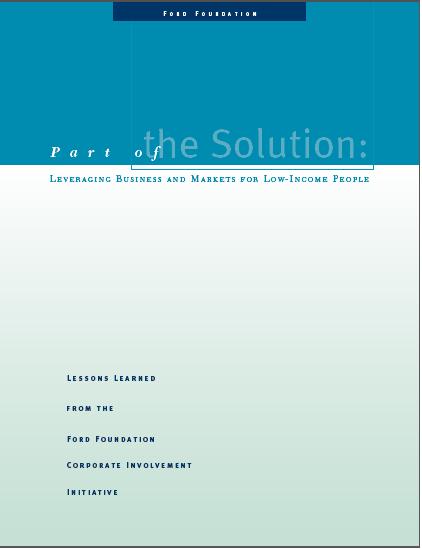This report presents lessons learned from the Corporate Involvement (CI) Initiative of the Ford Foundation, an effort that sought to demonstrate that businesses could use core operating resources and competencies in ways that contribute to large-scale improvement in income and assets for low-income people, while benefiting business. Influencing business and markets while advancing social goals is a key challenge for philanthropy and civil society. The roles of government, business and civil society are changing dramatically. Government is moving from resource provider to catalyst and enabler.
Business is globalizing and is a growing force in influencing societal well-being. Social innovations once stimulated by the public sector are increasingly seeded by business and expanded through the market. For foundations, working with companies and through markets is a critical, yet underutilized tool to unleash new resources that build assets and wealth in poor communities.
 The integration of business into grant-making strategies completes a ³three-legged stool² of public-privatecommunity alliances needed to improve low-income communities. It draws inspiration from the asset-building framework adopted by many funders and advocates, which defines assets as the broad array of resources that enable people and communities to exert control over their lives and participate in society in meaningful and effective ways. The CI Initiative was intended to demonstrate how business and communities could collaborate to generate ³win-win² outcomes competitive advantage for business and gains in assets and wealth for low-income people. We believe that the work of the organizations described in this report provides evidence that markets can be leveraged on behalf of low-income communities.
The integration of business into grant-making strategies completes a ³three-legged stool² of public-privatecommunity alliances needed to improve low-income communities. It draws inspiration from the asset-building framework adopted by many funders and advocates, which defines assets as the broad array of resources that enable people and communities to exert control over their lives and participate in society in meaningful and effective ways. The CI Initiative was intended to demonstrate how business and communities could collaborate to generate ³win-win² outcomes competitive advantage for business and gains in assets and wealth for low-income people. We believe that the work of the organizations described in this report provides evidence that markets can be leveraged on behalf of low-income communities.





